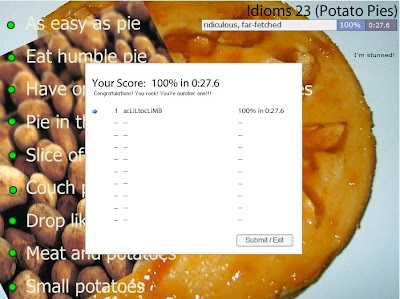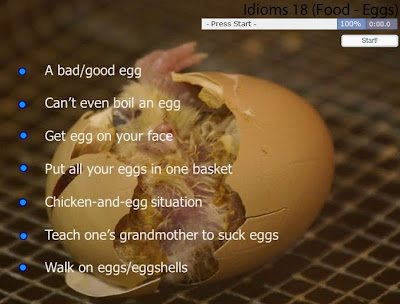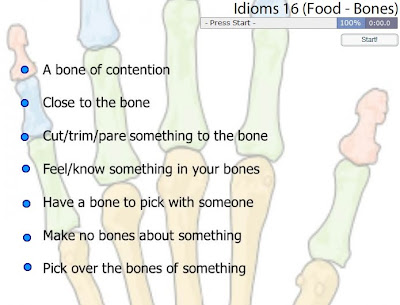One must be indeed cold and heartless not to be affected by the triple calamity of earthquake, tsunami, and threat of nuclear meltdown that hit Japan on Friday 11th March 2011. Why, even the Yakuza, Japan's notorious Mafia gang have been doing their bit to help, giving donations and driving relief supplies into radiation zones without protection. You can read about their humanitarian efforts
here.
If you wish to help, click on
this list to see a list of organisations accepting donations for Japan.
Still, life has to go on, and the series on idioms is no exception. I thought it would be a good idea to take a short break from food, and introduce you to idioms that you could easily come across in a conversation regarding the current situation in Japan.
an arm and a leg
very expensive: It will cause the Japanese an arm and a leg to rebuild their country after this disaster.
back to square one
This means that you are in the exact same situation you were before you started to do something, i.e., you haven't made any progress. This is similar to
back to the drawing board
When you try to do something and it wasn't successful, and you have to think of something new, you go back to the drawing board:
When the cooling system broke down, TEPCO resorted to using sea water to try to cool the nuclear fuel rods, but that didn't succeed, so they were back to square one.
They then tried to drop tons of water from helicopters flying above the reactors, but that didn't work very well either, so they had to go back to the drawing board.
bend over backwards
Willing to do anything to help: In spite of having lost all their possessions, they were still bending over backwards to help one another.
bite off more than you can chew
You do this when you take on a task that is way too big and complex for you: The Japanese originally rejected a US offer to help with their nuclear crisis, but they quickly realised that they had bitten off more than they could chew, and ended up accepting the help.
blue moon
a rare occurrence: Having a 9.0 earthquake, a tsunami that created waves more than 10 metres high, and a threat of a nuclear meltdown from a reactor whose cooling system (and the backups) failed, all at the same time is something that happens once in a blue moon.
cross your fingers
You do this to hope something will be all right: Let's cross our fingers and hope that their cooling system hasn't been damaged!
dropping like flies
Falling ill or dying in large numbers very quickly: Due to the lack of medical supplies, clean water, and food, the evacuees were dropping like flies.
every cloud has a silver lining
Even difficult times will lead to better days: They say every cloud has a silver lining, so let's cross our fingers and hope that this disaster will, paradoxically, end the world economical crisis.
everything but the kitchen sink
everything you own: Most people who were directly affected by the tsunami lost everything but the kitchen sink.
field day
an enjoyable day or situation: The anti-nuclear lobby was having a field day when the Fukushima nuclear reactors started having problems.
go against the grain
to be completely different to what you feel is right or normal: "The idea that the Japanese are acting in some way against the grain in an emergency situation is challenged by columnist Johann Hari in the UK's Independent." (
BBC News Magazine)
Good Samaritan
The Good Samaritan helps others in need without expecting compensation: The Yakuza turned Good Samaritan and started delivering relief supplies to the evacuation centres.
If it's not one thing, it's another
A series of thing that go wrong: It's incredible how if it's not one thing, it's another: the tsunami struck half an hour after the 9.0 earthquake, and then the Fukushima crisis began. After 8 days, they're still having aftershocks of great magnitude.
We're in the same boat if we're faced with the same challenges or difficult situation: Everyone is sharing what they have because they are all in the same boat.
keep your chin up
to remain happy in a difficult situation: It is truly amazing how people manage to keep their chins up in spite of the difficult situation they're facing.
kick the bucket
to die (although it tends to be used more in a humorous situation): In the darkness, the old lady tripped on a bucket, and literally kicked the bucket.
out on a limb
You go out on a limb when you put yourself in a risky situation, or in a situation where you get no support: The 200 or so workers of Fukushima are going out on a limb, risking their lives, to try to put the perilous situation under control.
saved by the bell
to be saved at the last possible moment: She was hanging on the tree, and was saved by the bell when the rescuers appeared out of nowhere.
start from scratch
to start all over again: When all this is over, the Japanese, especially in the North East, have to start their lives from scratch.
Apart from the usual tagging game (click on the image below), you can compose sentences of your own, showing how you've understood the idioms. Post them in the comments section below (click on the pencil icon).
Be sure to check out the rest in this series.
Go to the index file and search (ctrl F) for 'Idioms'.









